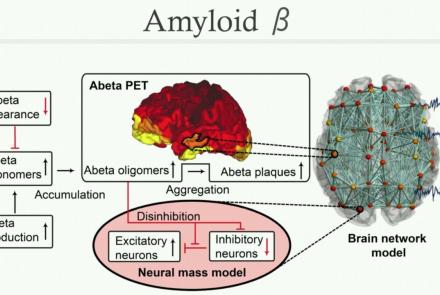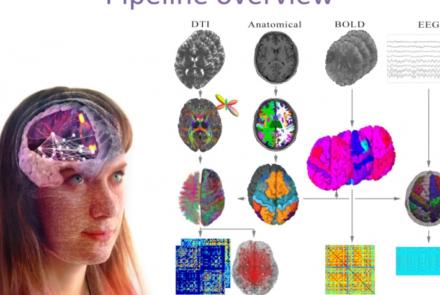In this tutorial, you will learn how to use TVB-NEST toolbox on your local computer.
Difficulty level: Beginner
Duration: 2:16
This tutorial provides instruction on how to perform multi-scale simulation of Alzheimer's disease on The Virtual Brain Simulation Platform.
Difficulty level: Beginner
Duration: 29:08
Course:
This lesson provides a brief overview of the Python programming language, with an emphasis on tools relevant to data scientists.
Difficulty level: Beginner
Duration: 1:16:36
Speaker: : Tal Yarkoni
Course:
An introduction to data management, manipulation, visualization, and analysis for neuroscience. Students will learn scientific programming in Python, and use this to work with example data from areas such as cognitive-behavioral research, single-cell recording, EEG, and structural and functional MRI. Basic signal processing techniques including filtering are covered. The course includes a Jupyter Notebook and video tutorials.
Difficulty level: Beginner
Duration: 1:09:16
Speaker: : Aaron J. Newman
This lecture covers the emergence of cognitive science after the Second World War as an interdisciplinary field for studying the mind, with influences from anthropology, cybernetics, and artificial intelligence.
Difficulty level: Beginner
Duration: 51:07
Speaker: : Paul F.M.J. Verschure
This lecture covers a lot of post-war developments in the science of the mind, focusing first on the cognitive revolution, and concluding with living machines.
Difficulty level: Beginner
Duration: 2:24:35
Speaker: : Paul F.M.J. Verschure
Introduction of the Foundations of Machine Learning in Python course - Day 01.
High-Performance Computing and Analytics Lab, University of Bonn
Difficulty level: Beginner
Duration: 35:24
Speaker: : Elena Trunz
In this lesson, you will learn about the current challenges facing the integration of machine learning and neuroscience.
Difficulty level: Beginner
Duration: 5:42
Speaker: : Dan Goodman
This lecture focuses on how the immune system can target and attack the nervous system to produce autoimmune responses that may result in diseases such as multiple sclerosis, neuromyelitis, and lupus cerebritis manifested by motor, sensory, and cognitive impairments. Despite the fact that the brain is an immune-privileged site, autoreactive lymphocytes producing proinflammatory cytokines can cause active brain inflammation, leading to myelin and axonal loss.
Difficulty level: Beginner
Duration: 37:36
Speaker: : Anat Achiron
This lesson discusses both state-of-the-art detection and prevention schema in working with neurodegenerative diseases.
Difficulty level: Beginner
Duration: 1:02:29
Speaker: : Nir Giladi
This lesson provides an introduction to neurons, synaptic transmission, and ion channels.
Difficulty level: Beginner
Duration: 46:07
Speaker: : Christoph Schwarzer
This lecture gives an introduction to the types of glial cells, homeostasis (influence of cerebral blood flow and influence on neurons), insulation and protection of axons (myelin sheath; nodes of Ranvier), microglia and reactions of the CNS to injury.
Difficulty level: Beginner
Duration: 40:32
Speaker: : Christine Bandtlow
This lecture covers integrating information within a network, modulating and controlling networks, functions and dysfunctions of hippocampal networks, and the integrative network controlling sleep and arousal.
Difficulty level: Beginner
Duration: 47:05
Speaker: : Christoph Schwarzer
This lecture focuses on the comprehension of nociception and pain sensation, highlighting how the somatosensory system and different molecular partners are involved in nociception.
Difficulty level: Beginner
Duration: 28:09
Speaker: : Serena Quarta
Course:
This lesson gives an introduction to simple spiking neuron models.
Difficulty level: Beginner
Duration: 48 Slides
Speaker: : Zubin Bhuyan
This lesson provides an introduction to simple spiking neuron models.
Difficulty level: Beginner
Duration: 48 Slides
Speaker: : Zubin Bhuyan
This presentation accompanies the paper entitled: An automated pipeline for constructing personalized virtual brains from multimodal neuroimaging data (see link below to download publication).
Difficulty level: Beginner
Duration: 4:56
Course:
The lecture provides an overview of the core skills and practical solutions required to practice reproducible research.
Difficulty level: Beginner
Duration: 1:25:17
Speaker: : Fernando Perez
This lecture on model types introduces the advantages of modeling, provide examples of different model types, and explain what modeling is all about.
Difficulty level: Beginner
Duration: 27:48
Speaker: : Gunnar Blohm
Course:
This lecture focuses on how to get from a scientific question to a model using concrete examples. We will present a 10-step practical guide on how to succeed in modeling. This lecture contains links to 2 tutorials, lecture/tutorial slides, suggested reading list, and 3 recorded Q&A sessions.
Difficulty level: Beginner
Duration: 29:52
Speaker: : Megan Peters
Topics
- Philosophy of Science (5)
- Artificial Intelligence (4)
- BIDS (3)
- Notebooks (2)
- Neurodata Without Borders (2)
- NIDM (1)
- Animal models (2)
- Assembly 2021 (26)
- Brain-hardware interfaces (1)
- Clinical neuroscience (10)
- International Brain Initiative (2)
- Repositories and science gateways (5)
- Resources (6)
- General neuroscience
(5)
- (-) General neuroinformatics (1)
- (-) Computational neuroscience (51)
- Statistics (1)
- Computer Science (2)
- Genomics (1)
- (-) Data science (6)
- Open science (10)
- Project management (3)
- Education (1)
- Neuroethics (6)


















